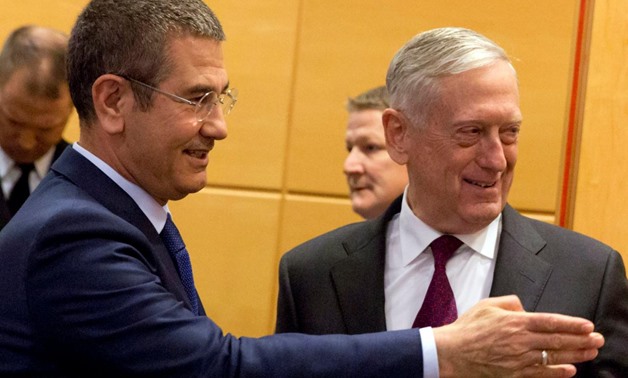
U.S. Secretary of Defence Jim Mattis poses with Turkish Defence Minister Nurettin Canikli during a NATO defence ministers meeting at the Alliance headquarters in Brussels, Belgium, February 14, 2018. REUTERS/Virginia Mayo/Pool
BRUSSELS/ANKARA - 16 February 2018: Turkey said on Thursday it had demanded the United States expel a Kurdish militia from forces it backs in Syria, setting up the visiting U.S. secretary of state for tough talks on an issue that has strained ties between the allies to the breaking point.
Rex Tillerson arrived in Turkey on Thursday for two days of what are expected to be uncomfortable meetings between allies whose relations have been fraying over a number of issues, above all Washington's support for the Syrian Kurdish YPG militia, which Ankara calls terrorists.
Turkey launched an air and ground assault last month in Syria's northwest Afrin region to drive the YPG from the area.
Ankara considers the YPG to be an arm of the PKK, a banned group that has waged a decades-long insurgency in Turkey. The YPG is the main ground element of the Syrian Defence Forces (SDF), which the United States has armed, trained and aided with air support and special forces to fight Islamic State.
"We demanded this relationship be ended, I mean we want them to end all the support given to the Syrian arm of PKK, the YPG," Turkish Defence Minister Nurettin Canikli told reporters in a briefing in Brussels, a day after meeting U.S. Defense Secretary Jim Mattis on the sidelines of a NATO meeting.
"We demanded this structure be removed from SDF," he said.
Speaking with reporters on the sidelines of the NATO meeting, Mattis said his talks with his Turkish counterpart were open and honest, but acknowledged differences.
"I believe we are finding common ground and there are areas of uncommon ground, where sometimes war just gives you bad alternatives to choose from ... We continue to collaborate on ways to ensure their legitimate concerns are addressed."
Tillerson, who is on a five-city tour, told a news conference in Beirut before arriving in Ankara that the United States and Turkey had the same main objectives, and put their differences down to tactics.
He met Erdogan at the president's palace in Ankara on Thursday evening and was due to meet the foreign minister, Mevlut Cavusoglu, on Friday.
"FIGHTING TERRORISTS WITH TERRORISTS"
Islamic State fighters were driven last year from all the population centres they occupied in both Syria and Iraq, but Washington still considers them a threat, capable of carrying out an insurgency and plotting attacks elsewhere.
Ankara has placed greater emphasis in recent months on the need to combat the Kurdish militia and has said the United States is merely using one terrorist group to combat another.
Turkey says the United States has yet to honour several pledges: to stop arming the YPG, to take back arms after Islamic State was defeated in Syria, and to pull YPG forces back from Manbij, a Syrian town about 100 km (60 miles) east of Afrin.
Canikli also said that Mattis had told him the United States was working on a plan to retrieve weapons given to the YPG, especially heavy weapons. However, Tillerson later said that Washington had "never given heavy arms" to the YPG and there was therefore "nothing to take back".
Turkey is the main Muslim ally of the United States within NATO and one of Washington's most powerful friends in the Middle East dating back to the Cold War era. But widening differences on Syria policy are just one of a number of issues that have caused a rupture in that strategic relationship.
Ankara also accuses Washington of sheltering a cleric it blames for plotting a failed coup in 2016. The United States convicted a Turkish banker mast month for violating sanctions on Iran in a case that included testimony alleging corruption by top Turkish officials.
Despite the tense language, military relations between the two allies appear, at least so far, to have avoided strain. The top U.S. general in Europe, Curtis Scaparrotti, said there had been no impact on its operation from Turkey's Incirlik air base, used by the Americans for strikes against Islamic State.
"Despite some of the rhetoric that you see, the most recent meetings ... are very productive," Scaparrotti told reporters in Stuttgart.
The Turkish offensive against the YPG in Syria has so far been limited to Afrin, a border region where the United States is not believed to have troops on the ground. But Turkey has openly discussed extending it to other areas where its forces could potentially come into contact with units supported by the Americans. It says Washington should pull its forces out of the way; the United States says it has no plans to withdraw.


Comments
Leave a Comment